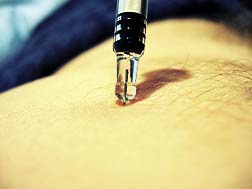 The Canadian Medical Association (CMA) on Monday summarized a German study in which a total of 320 heparin patients studied were found to develop skin lesions at an incident rate of 7.5 per cent. "During the study, we were surprised by the high number of patients with heparin-induced skin lesions," the study authors wrote. "For most patients, the diagnosis was made because of our study."
The Canadian Medical Association (CMA) on Monday summarized a German study in which a total of 320 heparin patients studied were found to develop skin lesions at an incident rate of 7.5 per cent. "During the study, we were surprised by the high number of patients with heparin-induced skin lesions," the study authors wrote. "For most patients, the diagnosis was made because of our study."Researchers were expecting an incidence rate of about two percent.
The study findings appear in the September 28th issue of the Canadian Medical Association Journal. They reveal that women were more likely than men to have the heparin allergic reaction that would be expected to result in skin lesions. Three factors—pregnancy, obesity and long-term heparin use—resulted in an elevated likelihood of developing the condition.
What concerns the study authors is the potential for the skin lesions to signal the presence of a serious condition known as 'heparin-induced thrombocytopenia,' a potentially life-threatening condition characterized by the decrease of platelets in the blood.
Heparin Reaction Could be a Reaction of a Far More Serious Condition
READ MORE HEPARIN LEGAL NEWS
Of the 320 patients enrolled in the German study, 24 presented with heparin-induced skin lesions. Delayed-type hypersensitivity reactions were identified as the cause in all 24 patients. One patient with histopathologic evidence of delayed-type hypersensitivity tested positive for antiplatelet-factor 4 antibodies.
The risk factor for long-term heparin use was identified as having a criteria of 9 days heparin therapy or longer.
The bottom line, according to the researchers, is to ensure an effort is made to identify the cause of the lesions, given that heparin-induced skin lesions appear to be relatively common. However, they could be an indication of a much more serious condition stemming from this particular heparin allergic reaction.
